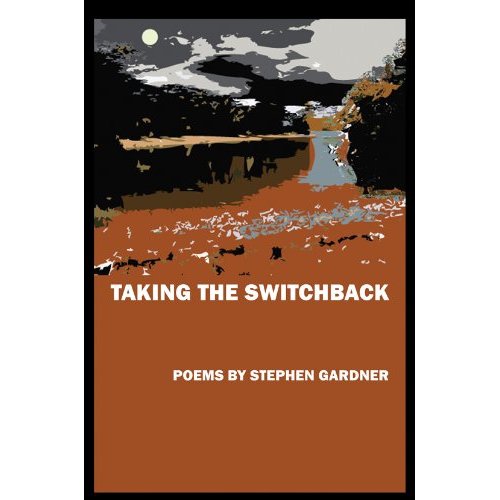|
Taking the Switchback by Stephen Gardner. Texas Review Press, 2009. 58 pp.
ISBN-10: 1933896337 ISBN-13: 978-1933896335
Review by William Wright
“Going Home,” the short poem that opens Stephen Gardner’s Taking the Switchback, admirably sets the course for the rest of this beautiful collection:
Down the road, lying with my face
Pressed into my father's lap, the wheel
He held claiming most of the space.
But I squeezed in, bending up
My knees, with the rest of my form
On the seat and in my mother's
Lap, not comfortable, but warm.
And they would sing together
Old songs. And I still can feel
Their soft strong hands on me again
And the cold hard turning of the wheel.
“Going Home” represents the best of Gardner’s work: unassuming, seamless, touching. More uniquely, though, is this poet’s gift for encapsulating readers in womb-like warmth, a comfortable shell, while simultaneously managing to leave us with an eerie afterthought, a bitter grin. Notice how the narrator’s past self winnows and rearranges himself uncomfortably to be near his parents. They sing old songs and protect him, but the wheel turns indefatigably, coldly. Life goes on, one ages, and one’s only recourse is to wrench the frigid wheel of memory back toward a more contented time. The majority of these poems are like that: Liquid in delivery, star-like in clarity, but leaving sharp residue. Readers weave the switchbacks of landscape, loneliness, and love, sometimes finding warmth, sometimes straying into winter’s shadow.
In one poem—“2 a.m., incense, a quart of gin, my dog with a bone”—the quiet reminds the narrator of “murders in the dark”—a world of loneliness and danger that takes away, snuffs the erratic candle’s flame. But then we move to a celebration of nearly grotesque fecundity in “Spring, Saturday Suburbia” with “[t]he frenzied coupling of dogs, tireless wasps / Chewing out the flat gray stuff of nests, / Squirrels running like cats on fire /Through oak and pine.” The narrator, peripheral, acutely sensitive, acts as a reflexive vessel through which spring’s bounty passes, “[f]or it is that time, again, And [he has] been watching it come.” Even a quotidian spring day becomes inevitable, incantatory, dream-like. Gardner’s collection celebrates this light and dark dichotomy, a landscape shot in triple-time: the sun arcs over the green world in a flash and the stars open in the twilight like wolf-eyes.
Truly, Gardner’s employment of the natural world enriches these poems immensely, making them move and sing, live and breathe. Take the first stanza of the poem “Below the Cliff”:
Here ivy tendrils hang through air
And attach themselves in lower places
To damp rocks. Some throw air‑roots
Into the bank, or wrap around
Rhododendron branches, growing
Long and thin in the small light
That filters down through the shrubs.
The ivy, roots, and rocks subtly threaten the light-dappled world, seemingly writhing, sentient. They “hang,” “attach,” “throw,” “wrap,” and “grow,” beautiful but muscled with energy. Even so, the human element enters the poem, introducing a more familiar, palpable life:
And in spite of the mist
That drifts into our eyes
We can see to move
Across the foot of the falls,
Rock to rock, leaving our prints
Flat in the moss and algae, wet and shining
In the afternoon.
The narrator hears voices calling him on the other side of the bank and leaps, only “slightly safe” until he finds his balance, once again with human contact. Much like this narrator, readers must leap into these poems only slightly safe, traversing the landscape of a man’s life, the circuitous paths of loneliness, love, and celebrations of both the light and the dark.
Town Creek Poetry features Stephen Gardner in the Fall 2007 issue with fifteen of Gardner’s poems—some from this collection and a few from the equally wonderful This Book Belongs to Eva, a chapbook. Gardner’s interview feature explores his life as a teacher and poet and offers fascinating reading as well. |

